St. Petersburg
Saint‑Petersburg is one of the most beautiful cities in the world with a rich cultural heritage, and is rightly called the “Cultural Capital of Russia”.
Saint‑Petersburg was founded in 1703 by Peter I as the new capital of the Russian Empire. Numerous world-famous architects, including Domenico Trezzini, Bartolomeo Francesco Rastrelli, Giacomo Quarenghi, Carlo Rossi, Jean-Baptiste Le Blond, Auguste de Montferrand, Vasily Bazhenov, Andrey Voronikhin, Andreyan Zakharov, Vasily Stasov, Alexander Brullov, took part in the construction of the city, and its architectural ensemble was decorated by famous sculptors such as Carlo Bartolomeo Rastrelli, Étienne Maurice Falconet, Peter Clodt, Alexander Opekushin, Mikhail Mikeshin. The new beautiful city became the capital of the Russian Empire for over 200 years.
18th and 19th centuries marked the onset of the stage of brilliant development of Saint-Petersburg and Russia as a whole, coined as the "Golden Age" of Russian art. Very few cities in the world can boast of so many attractions, museum collections, opera and drama theaters, manors, palaces and parks. The literary and musical heritage of the city is no less outstanding, and the number of writers, poets and composers who were inspired by its misty shores might strike even the boldest imagination: Alexander Pushkin, Fyodor Dostoevsky, Nikolay Leskov, Modest Mussorgsky, Alexander Borodin, Nikolay Rimsky-Korsakov, Pyotr Tchaikovsky and many others.
Saint-Petersburg is a "City of Bridges": 68 rivers and canals cross the city, forming 42 islands within city limits. As of today, there are 580 bridges, including 20 drawn bridges in Saint-Petersburg and its suburbs, so the city has been rightly dubbed the "Venice of the North".

Along with Paris, Rome and Venice, Saint‑Petersburg is included in the list of UNESCO World Heritage Sites, and the UNESCO World Heritage List includes about 4000 outstanding architectural, historical and cultural monuments of Saint-Petersburg.
However, Saint-Petersburg is not just an open-air museum, but is also one of the largest scientific and educational centers of Russia. It was in Saint-Petersburg where the Russian Academy of Sciences was set up by the Decree of Emperor Peter the Great, and the first secular higher educational institution of Russia, the Academic University, was opened. Higher education and science of the Northern Capital was glorified by great scientists such as Daniel Bernoulli, Leonhard Euler, Moritz Hermann (Boris) von Jacobi, Alfred Bernhard Nobel, Mikhail Lomonosov, Dmitry Mendeleev, Ivan Pavlov, Alexander Popov, Zhores Alferov and many other scholars whose names are in the global Hall of Fame of scientific thought.
Since the foundation of the city, scientific and educational activities never ceased, even during the Second World War. In wartime, not just active development of new weapons and industrial development took place, but scientific research was going on, experiments were conducted, new discoveries were made.
Presently 73 public and private higher educational institutions are involved in educational activities in Saint-Petersburg. 81 secondary professional education organizations along with 33 higher educational institutions train qualified specialists.
A wide network of research centers and institutes has been formed in the city, including more than 295 scientific organizations.

SCIENTIFIC AND EDUCATIONAL POTENTIAL OF SAINT‑PETERSBURG


Saint‑Petersburg is a recognized scientific center of Russia, concentrating over 10% of the country's scientific potential, as well as the center for academic, sectoral and university research, capable of generating scientific and technical achievements, both in the priority areas of modernization of the Russian economy, as well as in the priority areas of development of science, engineering and technology.
Scientific spheres (fields of study) of higher education:
Higher and Secondary Professional
Education System of St. Petersburg
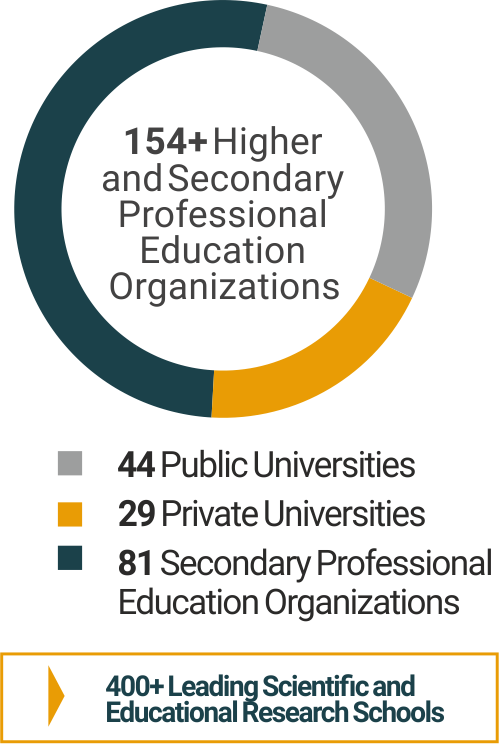
Scientific Organizations
of St. Petersburg
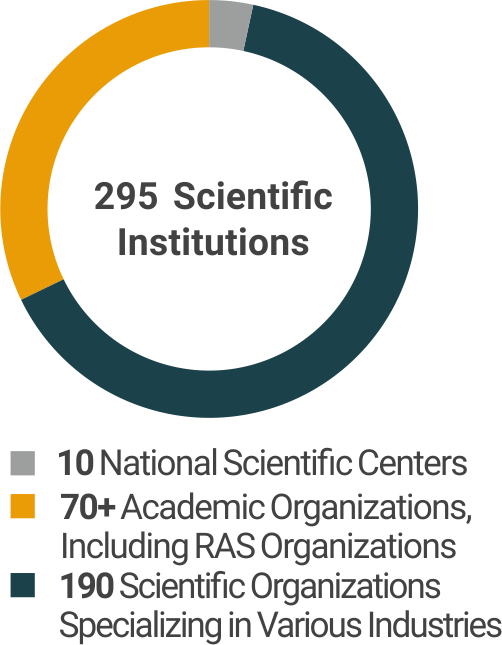
Science and Education Talent Pool
of St. Petersburg
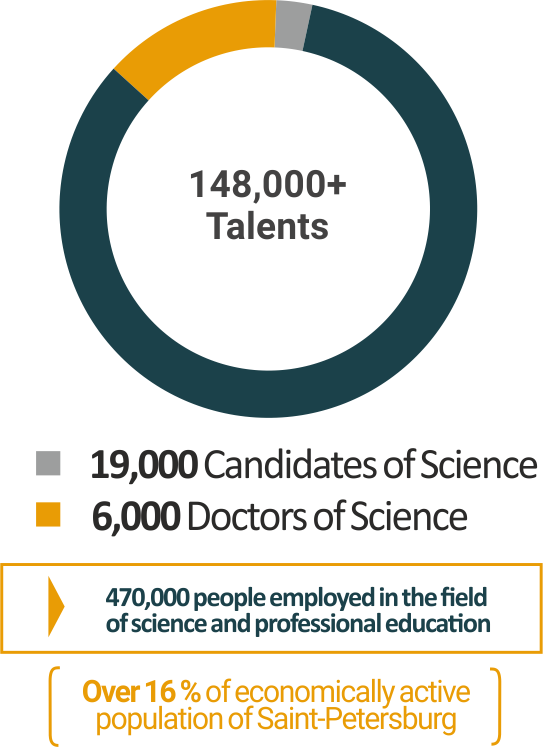
Strong professional education system has been and remains an important competitive advantage of Saint-Petersburg, even more significant in the context of transition to the knowledge economy. It is the largest branch of the social sector of the city, providing jobs for over 86,000 teachers and other professionals, and carrying out training and socialization of over 408,000 students and postgraduate students. 16% of the economically active population of Saint-Petersburg (over 470,000 people) are employed by or study in the professional education system, which trains highly qualified professionals not only for Saint-Petersburg, but for all regions of Russia, as well as for other countries of the world.
In order to attract young people to science, promote innovative activities among them and bring young talents to companies, a number of contests for students and graduate students is held every year, and prizes of the Government of Saint-Petersburg are awarded. An effective grant and competition system proves that a unique environment has been created in Saint-Petersburg for obtaining a university degree and subsequently applying the newly acquired professional skills and talents.
The Committee for Science and Higher Education is the government body in charge for the development of Saint-Petersburg's policy in the field of science and higher education.
Professional education
According to the study “Accessibility of Higher Education in Russian regions” (National Research University “Higher School of Economics”, 2016) in the ranked list of regional systems of higher education St. Petersburg region is:
First place on the provision of quality places
| 1 | St. Petersburg and Leningrad region | 212 014 places | 64,7 % | |
| 2 | Tomsk region | 37 191 places | 56,9 % | |
| 3 | Sverdlovsk region | 69 250 places | 47,2 % | |
| 4 | Moscow and Moscow region | 355 774 places | 38,1 % |
First place in terms of financial accessibility of higher education
| Education, ₽ | Accommodation, ₽ | Other, ₽ | Income, ₽ | Overall rate | ||
| 1 | St. Petersburg and Leningrad region | 46 576 | 12 200 | 101 133 | 391 474 | 13,2 |
| 2 | Amur region | 38 913 | 0 | 114 468 | 321 290 | 15,0 |
| 3 | Vologodskaya Oblast | 40 898 | 742 | 102 936 | 299 339 | 15,5 |
| 29-30 | Moscow and Moscow region | 78 258 | 30 173 | 144 841 | 424 066 | 19,5 |
As in previous years, St. Petersburg universities confirmed their high positions among all Russian universities. Three St. Petersburg universities are included in the top 10 universities with the highest average of the Unified State Examination (EGE) in 2018: St.Petersburg State University, St.Petersburg National Research University of Information Technologies, Mechanics and Optics (ITMO University) and HSE University – St Petersburg.
| 1 | Moscow Institute of Physics and Technology (State University) | 96,4 |
| 2 | National Design Institutey | 95,6 |
| 3 | MGIMO University | 95,3 |
| 4 | Higher School of Economics (Moscow) | 94,6 |
| 5 | St.Petersburg State University | 91,8 |
| 6 | Pushkin State Russian Language Institute | 90,8 |
| 7 | HSE University – St Petersburg | 90,5 |
| 8 | National Research Nuclear University MEPhI (Moscow Engineering Physics Institute) | 90,3 |
| 9 | St.Petersburg National Research University of Information Technologies, Mechanics and Optics (ITMO University) | 90,2 |
| 10 | Russian Presidential Academy of National Economy and Public Administration | 89,7 |




























































Bachelor's, Specialist and Master's Degree:
More than 278.8 thousand students - in public universities
More than 22.7 thousand students - in private universities
The number of foreign citizens enrolled in Bachelor's, Specialist and Master's programs at St. Petersburg universities has increased significantly over the last years and amounted to 28,2 thousand people in 2018.
More than 90.3 thousand students receive state academic scholarship in the 2018/2019 academic year.
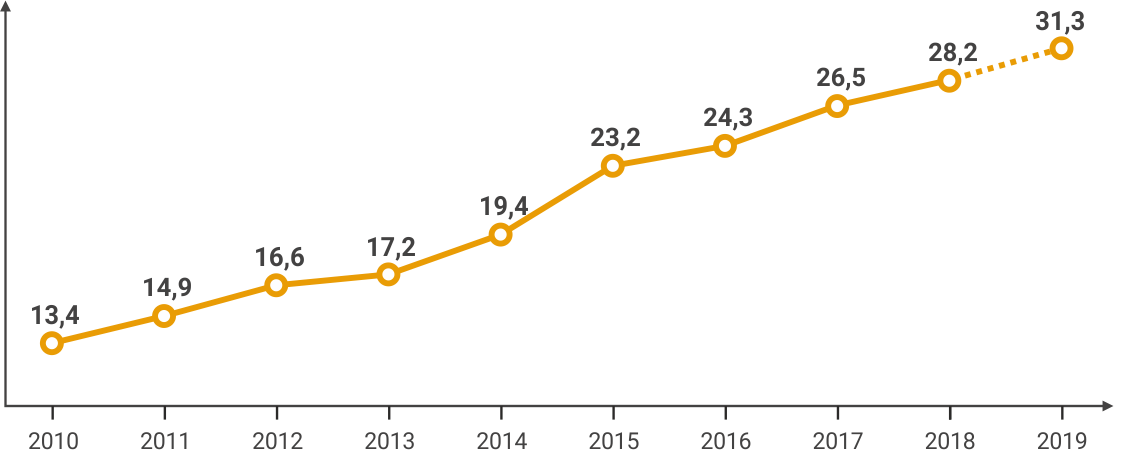

Admission to St. Petersburg higher education institutions for higher education programs (Bachelor's, Specialist and Master's Degree) for all forms of education in the 2018/2019 academic year amounted to more than 92.9 thousand people, which is higher than in previous years - 87.7 thousand in 2016/2017 academic year, 90.2 thousand people in the 2017/2018 academic year.
The share of nonresident undergraduate students enrolled onto full-time study at public universities increased from 38% in 2002 to 70.5%.
The graduation of higher education degree professionals from St. Petersburg universities in all modes of study amounted to more than 66.8 thousand people in 2018, including 60.5 thousand people in public universities and 6.3 thousand people in private.
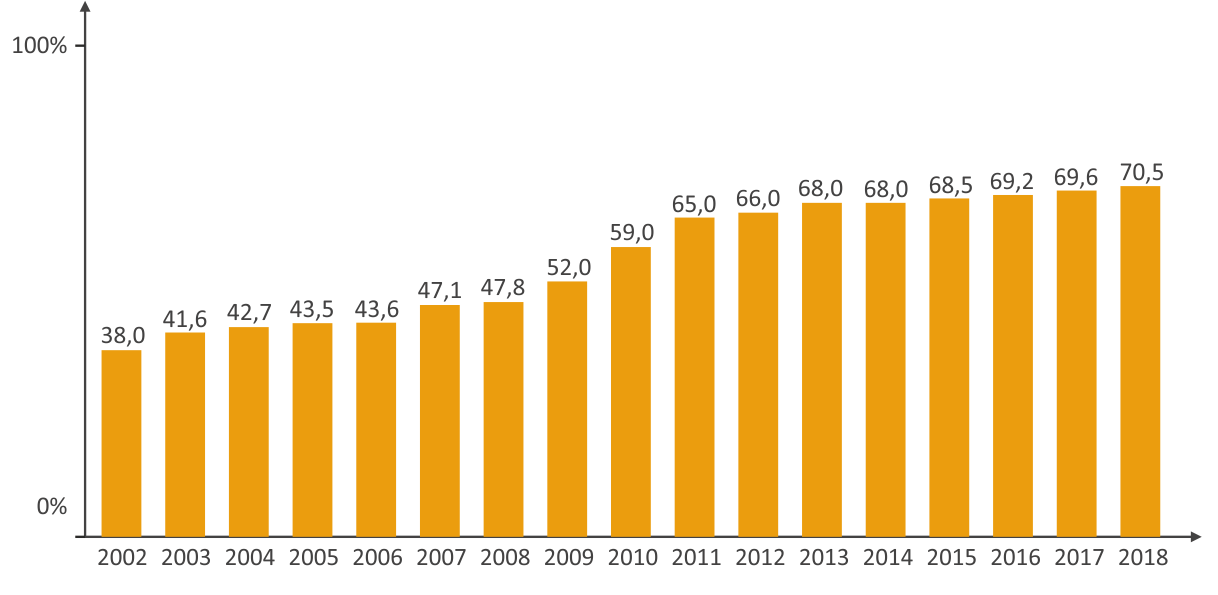
The system of secondary professional education (SPO) in 2019 included 114 educational organizations that implement training programs for semiskilled workers and training programs for skilled workers and professionals.
81 secondary professional educational organizations
76 municipal secondary professional educational organizations under the supervision of the six St. Petersburg executive government authorities
2 federal secondary professional educational organizations
3 private secondary professional educational organizations
33 universities
27 public
6 private
The total number of secondary professional education students in St. Petersburg exceeded 77.2 thousand people (including 72.6% at independent professional educational organizations and 27.4% at universities); admission amounted to 26.8 thousand people, graduation - more than 16.3 thousand people.
In St. Petersburg, in the 2018/2019 academic year, more than 2.3 thousand international students from 48 countries of the near and far abroad (or FSU and beyond, CIS and beyond), as well as stateless persons are enrolled in secondary professional education programs.
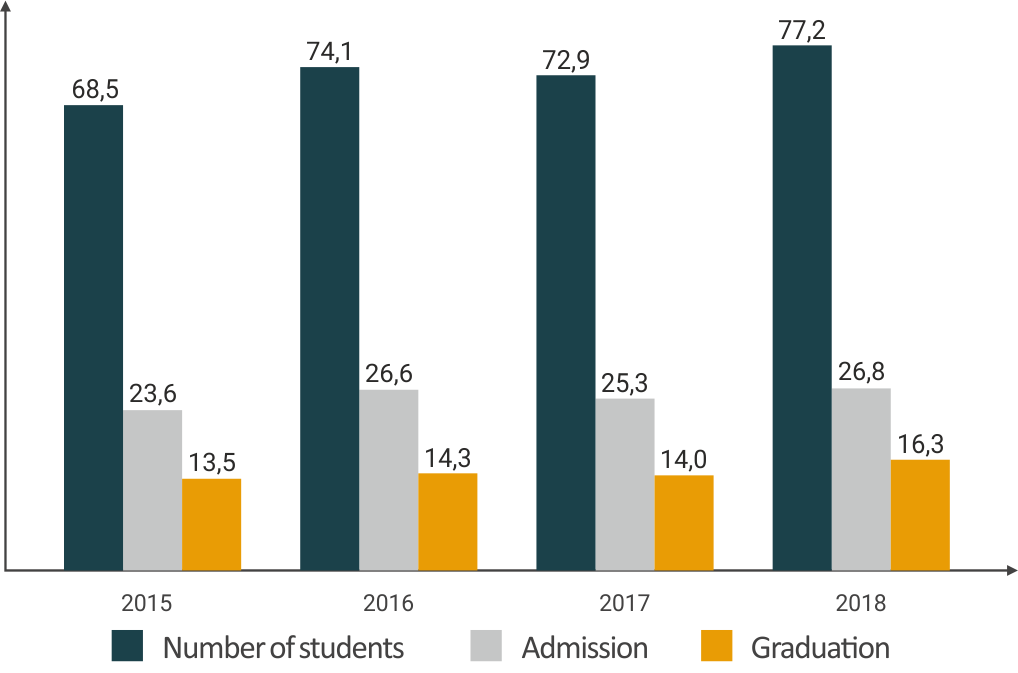
The number of professionals in St. Petersburg secondary professional education system is more than 15.3 thousand people, including more than 5.3 thousand teaching staff.
International rankings
Saint‑Petersburg universities hold strong positions in international university rankings(THE, QS, ARWU, MosIUR).
For example, in 2016-2022 fifteen Saint-Petersburg universities were included in the rankings:
St.Petersburg State University,
Peter the Great St.Petersburg Polytechnic University,
ITMO University,
St. Petersburg Mining University,
St. Petersburg Electrotechnical University "LETI" (ETU),
St. Petersburg State Institute of Technology,
Herzen State Pedagogical University of Russia,
St.Petersburg State Economic University,
St. Petersburg State University of Aerospace Instrumentation (SUAI),
Financial University under the Government of the Russian Federation, Saint-Petersburg Branch,
European University at Saint-Petersburg (EUSP),
HSE University-St.Petersburg,
The North-West Institute of Management of the Russian Presidential Academy of National Economy and Public Administration,
Emperor Alexander I St. Petersburg State Transport University and
Rimsky-Korsakov St. Petersburg State Conservatory.
Student capital
Saint-Petersburg is rightly called the Student Capital of Russia. Best Student Cities QS list 2019, Saint-Petersburg ranked the 66th.
391,000 students and graduate students, including over 39,000 foreign students from 150 countries in Saint-Petersburg.
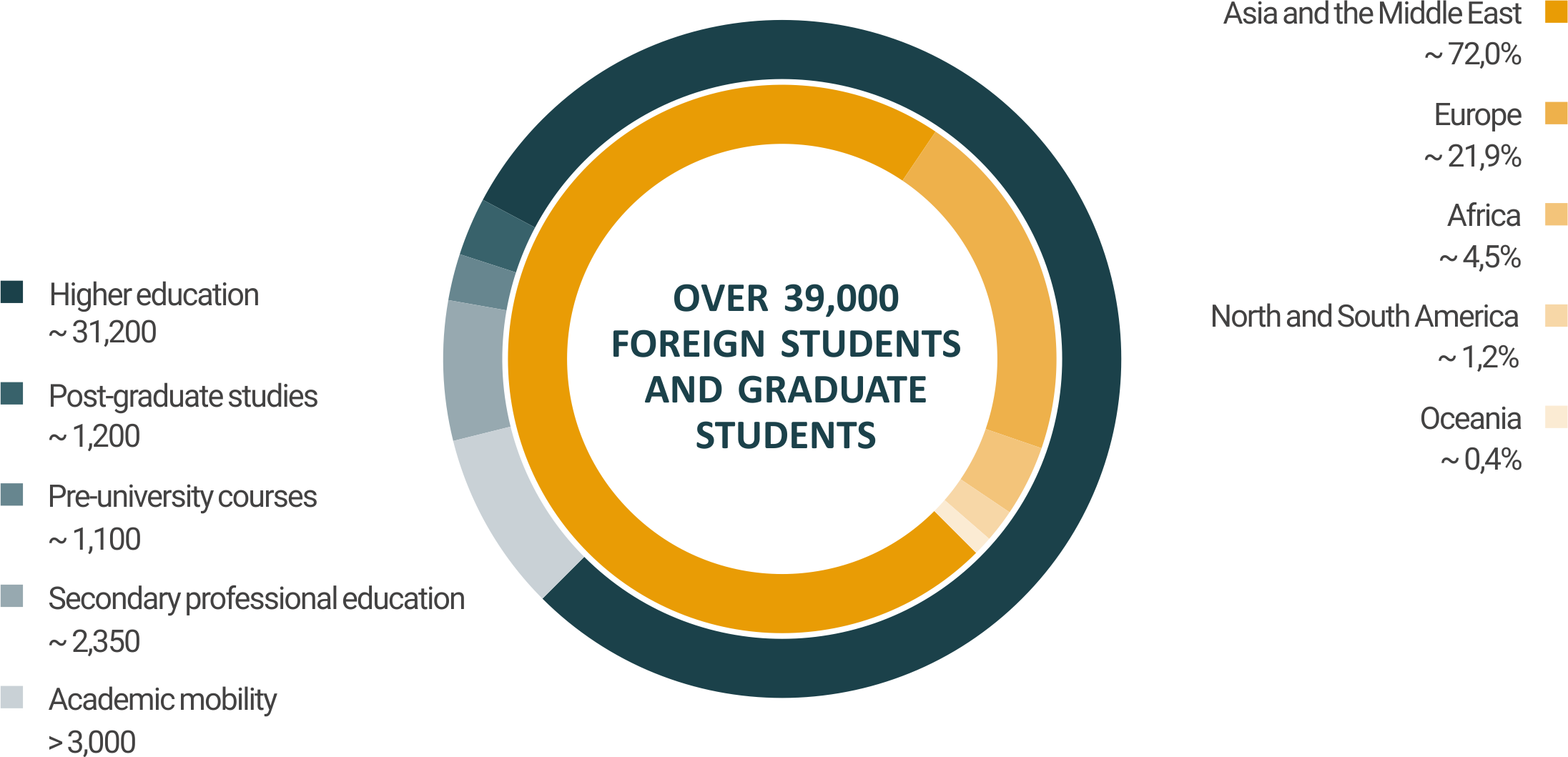
The share of foreign students in the city's universities amounts to ~ 10 % of the total number of Saint-Petersburg students, which matches the level of leading international educational centers. Saint-Petersburg universities offer double degree programs, networked learning and online learning programs. An effective system for learning Russian as a foreign language has been developed for future students. Saint-Petersburg universities offer educational programs in Russian, English, French, German, Spanish, Italian, Chinese and other foreign languages.
International cooperation
The development of international and interregional cooperation of Saint-Petersburg in the field of professional education and science is carried out in accordance with international and interregional agreements of Saint-Petersburg, programs for the development of professional education and science of Saint-Petersburg, and instructions of the Governor of Saint-Petersburg.
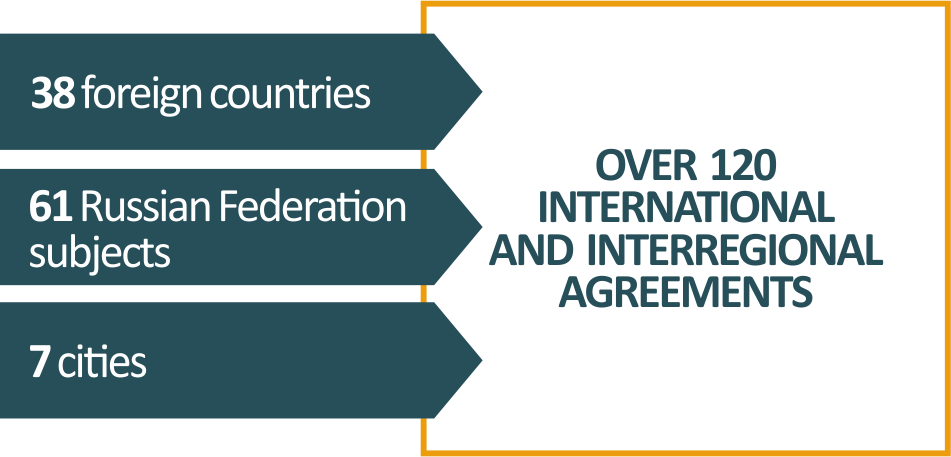
Higher educational institutions, professional educational organizations and scientific organizations of Saint-Petersburg have concluded and are implementing over 4,600 agreements with partners from foreign countries and Russian Federation regions, including more than 3,800 international agreements and more than 800 interregional agreements.
Within the framework of partnership agreements, educational and scientific organizations of Saint-Petersburg cooperate in the field of implementation of joint research and educational programs and projects, exchange of scientific and technical information and literature, participation in joint congresses in the field of professional education and science, joint publication of the results of scientific research, etc.
Annually more than 1,500 foreign delegations visit educational organizations of Saint-Petersburg
Representatives of Saint-Petersburg universities make more than 4,500 visits to foreign countries and Russian Federation regions
Over the past year, Saint-Petersburg universities have participated in more than 1,5 thousand major international congress events
To develop and reinforce the educational and scientific potential of Saint-Petersburg, the Government of Saint-Petersburg has been regularly holding a number of major national and international events in the field of science and education, including the Week of Science and Professional Education of Saint-Petersburg, which includes Saint-Petersburg International Science and Education Fair and Saint-Petersburg Congress “Professional Education, Science and Innovation in the XXI Century”, Saint-Petersburg International Innovation Forum and other events.

 Русский
Русский 中文
中文 Español
Español Français
Français العربية
العربية

